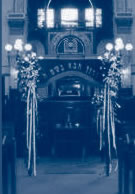| SEDRA : Achare Mot Hertz Chumash
p. 480 Leviticus Chap. 16
This week's Sedra is generously sponsored by Alan Marks.
SYNOPSIS:
Following the death of his sons Nadav and Avihu as a result
of their improper service, Aharon is told to enter the Holy
of Holies once a year only on Yom Kippur.
This day atonement was to be made for the sins of the community
including the Priesthood, and the Sanctuary was purified from
anyone who had entered it while ritually unfit.
On this day the High Priest himself, attired for most of the
time in simple white garments rather than his illustrious
gold vestments, offered all the sacrifices. These included
his own personal sin and burnt offerings paid from his own
resources, and similar communal offerings brought on behalf
of the nation. As part of the ritual, the High Priest gathered
a handful of incense and entered the Holy of Holies.
Two male goats were provided by the people for their sin offering
and the High Priest cast lots to determine which was to be
sacrificed. The other goat called "Azazel" over
which he confessed the sins of the people, was sent into the
wilderness where it would eventually die, symbolic of the
removal of the nation's sins.
The day was instituted as a Sabbath of Sabbaths, each Jew
is to `afflict' himself by fasting and to repent of his misdeeds
on this day.
Regulations limiting sacrifices to the altar of the Sanctuary
are reiterated. The laws prohibiting consumption of an animal
which had died without ritual slaughter and the prohibition
of the intake of blood are promulgated.
The people are reminded of the high level of morality, especially
in marriage and sexual conduct, expected of the Jewish people.
The details of illicit marriages and adultery are set out.
HAPHTORAH HERTZ CHUMASH P. 509 Amos. Chap 9 : 7 - 15
The haphtorah continues to exhort the Jew to the ideal of
Holiness. Holiness as illustrated by commitment to the highest
standards is what distinguishes the people of Israel, for
G-d's relationship with them rests on moral foundations. Without
these standards, Israel is no more to G-d than any other nation.
TELL ME RABBI ..... I'VE BEEN OFFERED AN ALIYAH
The honour of reciting the blessings over the Torah is called
an aliyah, which means "going up". The person honoured
ascends or goes up to the bimah where the Torah is read. This
also represents a spiritual ascent. Several occasions in life
are traditionally appropriate for an aliyah and are made more
significant by this honour. They include one's Barmitzvah,
before one gets married (aufruff), naming a baby daughter,
and one observing a yahrzeit. An aliyah to mark a birthday,
anniversary, recovery from a sickness, or when one wants to
recite the "gomel" blessing is also appropriate.
Synagogues try to be accommodating where possible.
On Monday and Thursday mornings, on Shabbat and Yom Kippur
afternoon, as well as on Channukah, Purim, and all fast days,
the Torah reading is divided into three portions, or "aliyot".
On Rosh Hodesh and on the intermediate days of Pesach and
Succot (chol hamoed), four people are called up. On the festival
days of Pesach, Shavuot and Succot and on Rosh Hashannah,
the Torah reading is divided into five aliyot. On Yom Kippur
morning there are six aliyot. On Shabbat the Torah reading
is divided into seven aliyot. It is not permissible to call
up fewer than the prescribed number. Except for Shabbat (and
Simchat Torah), it is not usual to add to the prescribed number.
Since Jewish law permits more than seven aliyot on the Shabbat,
some Congregations call up more than seven men. Some Synagogues
disallow this practice because it lengthens the service. Our
Shule allows a limited number of additional Aliyot as we have
a large membership and many functions to accommodate.
The first aliyah is always given to a Kohen (one of priestly
descent), if one is present. The Mishnah cites the "ways
of peace" as the reason for this practice. There is also
a Torah requirement "to sanctify him" (Lev. 21:8)
giving the Kohen priority in sacred matters.
The second aliyah is then given to a Levite.
The remaining aliyot are distributed among the rest of the
Congregation classified as "Israelites". The names
of the other aliyot are really the Hebrew words for the ordinal
numbers. Shlishi ("third"), Revi'i ("fourth"),
Hamishi ("fifth"), Shishi ("sixth"), Shvi'i
("seventh").
Each additional aliyah is called hosafah "additional"
and the very last hosafah is called aharon ("last").
CORRECT PROCEDURE FOR THE ALIYAH.
* Hasten to go up to the Torah - We usually ascend the bimah
from the right side and descend from the left. (Temple practice
was ascent to the altar from the right and descend from the
left (Zevahim 63a, b).
A parallel tradition: take the shortest possible route to
the bimah to show respect for the Torah (regardless of whether
it means going up by left or right) and return to your seat
by the longest route symbolising reluctance to leave the Torah.
Priority is given to the shorter route, even if it means ascending
from the left (OH 141:7). We always leave or descend from
the opposite side to the one used going up.
* The Torah Reader points to where he will begin to read.
With the edge of your tallit, touch the scroll or where the
reading begins and kiss the Tallit lightly. Stand in front
of the Torah grasping it with the two handles (called Eitz
Chayim - Tree of Life) projecting from the bottom of the scroll.
* Keep the scroll closed and begin the Bracha. The Congregation
respond and you repeat it. Open the scroll as you come to
the end of the blessing.
After the reading you recite the second blessing, another
person is called up to the Torah. You are then asked your
name and a personalised blessing (MiSheberach) is made on
your behalf.
Traditionally a donation to the Synagogue is pledged at this
point linking G-d's blessing with a demonstration of your
own generosity.
* At this time a special Mi She'beirakh prayer may be recited
to name a baby or for a sick person. Provide the person's
Hebrew name and that of his or her mother. Apparently, a mother's
prayer is considered more sincere and more likely to be favourably
received ( Psalms 116:16, where David beseeches G-d saying,
"I am Thy servant, the son of Thy maidservant").
* Remain on the bimah until the person who receives the next
aliyah completes the second blessing. Return slowly to your
seat.
BACK TO SHABBAT SHALOM TABLE
|








